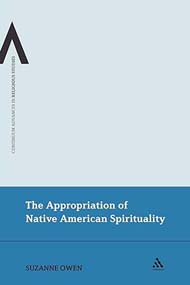The Appropriation of Narive American Spirituality
Continuum Advances in Religious Studies
Suzanne Owen
Continuum International Publishing Group, 2008
Continuum Advances in Religious Studies is a groundbreaking series offering original reflections
on theory and method in the study of religions, and demonstrating new approaches to the way religious
traditions are studied and presented.
Series editors: Gregory Alles (McDamiel College, USA);
James Cox (University of Edinburgh, Scotland);
Peggy Morgan (Oxford University, UK).
'Owen's work perceptively combines the examination of complex issues involved in the
appropriaton of Native Spiritualities by non-Natives with the reappropriation of
traditions by a specific Native group.'
- Raymond Bucko, professor of Anthropology, Creighton University, USA
Native Americans and Canadians are largely romanticised or sidelined
figures in modern society. Their spirituality has been appropriated on a
relatively large scale by Europeans and non-Native Americans, with little
concern for the diversity of Native American opinions. Suzanne Owen
offers an insight into appropriation that will bring a new understanding
and perspective to these debates. This important volume collects together
these key debates from the last 25 years and sets them in context,
analyses Native American objections to appropriations of their spirituality
and examines 'New Age' practices based on Native American spirituality.
The Appropriation of Native American Spirituality includes the findings
of fieldwork among the Mi'Kmaq of Newfoundland on the sharing
of ceremonies between Native Americans and First Nations, which
highlights an aspect of the debate that has been under-researched in both
anthropology and religious studies: that Native American discourses about
the breaking of 'protocols', rules on the participation and performance
of ceremonies, is at the heart of objections to the appropriation of Native
American spirituality.
Suzanne Owen completed her PhD at the University of Edinburgh, Scotland.
(The text above comes from the back of the book)



